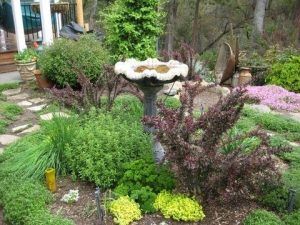Smart Gardening Decisions for Water Quality
A smart gardener conserves water, nurtures the soil, practices responsible pest control (IPM), conserves energy and encourages wildlife.
Master Gardeners have celebrated July-Smart Irrigation Month-by offering information to help you irrigate “smarter.” Today, we’ll talk just a bit about making smart decisions to protect our water quality.
Do you know what the #1 irrigated crop is in the U.S.? Turf lawns! The American Dream has long been represented by a home and a lawn. We invite you to change this urban myth. Why struggle to maintain a culture that consumes time, money and petrochemicals that jeopardize our security and our economy? What can we gardeners do to turn this around and make our landscapes more positive than negative?
Pesticides: Synthetic pyrethroids are made from ingredients obtained from petrochemicals. Bifenthrin, one of the most commonly used pyrethroids, is a broad-spectrum pesticide that kills most insects in its path. It is highly toxic to fish (think salmon), crustaceans (think shrimp and lobster), bees (think pollinators), and is moderately toxic to birds.
In research conducted by Loren Oki of U.C. Davis, four surface water drainages were sampled in the Sacramento region and four in Orange County. Each site was sampled a minimum of 44 times and as many as 66 times. In virtually all of the samples (90-100%!!!!) the pollutants found in surface waters were fipronil, used for ant and termite control (Termidor®), and bifenthrin!
What to do? Identify any pest before spraying it with a pesticide. Better yet, do nothing and let nature take care of the problem. Plant things that will create a natural balance in your landscape; good bugs will come to attack the bad bugs. Or use yellow sticky traps that catch aphids, whiteflies and leafhoppers without using pesticides.
Fertilizers: In an article dated Monday, May 17, 2010, the San Francisco Chronicle headlined that California’s groundwater supply is tainted by nitrates. The source? Nitrogen-based fertilizers-including those we use on our lawns and gardens-animal manures (including our pets), and leaking septic systems. In research conducted locally by the Resource Conservation District (RCD) Steam Teams, our Tuolumne County surface streams are contaminated by nutrients and pathogens leaking from our septic systems.
What to do? If you have a septic system, have it inspected. If you use synthetic fertilizers (also made from petrochemicals) on your lawn or garden, follow the package directions carefully and don’t over fertilize. If a little is good, a lot is NOT better! Or use natural fertilizers such as manures or compost that release a broader array of micronutrients over a longer time span. Test your soil to see if you even need fertilizer.
Run-off: We’ve covered our California hillsides with houses, patios, driveways, and roads. Irrigation running into the streets from our lawns and gardens carries fertilizers, pesticides, pathogens, sediment, oil, gasoline, diesel fuel, brake residues, and emissions from engine combustion. The streets and gutters run to the storm drains which dump into our local creeks. Creeks carry pollutants to the rivers, to the reservoirs, into San Francisco Bay and the Pacific Ocean.
What to do? Remember, the ocean begins right outside your door. Don’t let water leave your property. “Ban the berm.” Sloped lawns with turf are difficult to irrigate. Water runs downhill. Design your slope with catch basins or “swales” that will collect the water below the slope and drain it into the soil. Use permeable materials like pavers and bricks to create driveways and patios. Use rain chains and rain barrels (many models are available on-line).
And whatever you do, determine to make at least one small decision to be smart about protecting our water quality.
Rebecca Miller-Cripps is the UCCE Tuolumne County Master Gardener program coordinator. This article is based on research conducted by U.C. Davis, U.C. Riverside, Orange County Master Gardeners and Tuolumne County RCD Steam Team.

